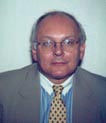

William Rockford
In an exclusive interview with World Cogeneration, William Rockford, Managing Director for Chase Securities, looked into the electric utility industry's future and forecasted that "The electric utility industry will go through the same shakeup as every regulated industry that has moved from that nice cozy environment with no competition to one with competition:" By example, the commercial banking industry experienced significant transitions over the past decade as a result of regulatory mandates which tied the hands of the industry, giving competitors free reign., thereby creating an uneven playing field. Similar regulatory constraints are now handcuffing the public utilities industry.
Rockford categorizes utility assets into three types: generating, transmission and distribution. In his view, the managers of utilities will have to decide whether to become distribution companies, generating companies or to remain integrated utilities. From his perspective the distribution assets are the least susceptible to competitive forces and therefore probably best suit the corporate culture of many currently configured electric utilities. He believes "Some utility companies will become simply distribution companies shedding their generating assets and a acquiring the distribution assets of other companies. Rockford believes that these companies will take on new corporate identities marketing themselves as service companies - not power producers. He goes further and says "These distribution companies will look at their customers more in the framework of 'how do I go to this customer as a service company and get him the best power purchase price'? This concept differs radically from the one we have right now in which utilities basically produce and sell power from their own power plants."
The competitive pressure to utility companies will come from various quarters, especially other utility companies within the same power pool. Rockford points to industrial customer, "For instance, any potential producer can go to an industrial customer which is the utility's best customer and take away that best business customer by offering a better price from a dedicated plant. If it is inside the customer's fence it is unregulated."
In Rockford's view, generating assets are most susceptible with competition coming from two directions. First independent competitors not having the same regulatory constraints as the utilities, have entered the market and will continue to do so. That nearly 50% of new generating capacity comes from this sector bears witness to this competition. Rockord believes that this makes for a very difficult situation for the utilities. However he feels that "Some utilities will decide that they know generation very well and decide that they want to get out of state commission regulations and therefore sell off their distribution assets."
Second, those utilities that remain power generators will need to take a hard look at power pool arrangements. Rockford says "If you take the power pools and change the market environment to a competitive environment, then you must be prepared for massive change. Under the current scenario, even if the utility is the high cost producer, it still gets a return on its rate base. Change that system and tell the high cost generator that it will not be paid for that generating unit unless it sells power from it and the high cost unit will have major problems. Right now the power pools are not cooperative not competitive. The utilities are looking over their at their sister companies."
Rockford recognizes that some utilities will remain integrated although he is uncertain whether they will continue to prosper. In his view, they are fighting rearguard actions since the regulatory process will be five steps behind.